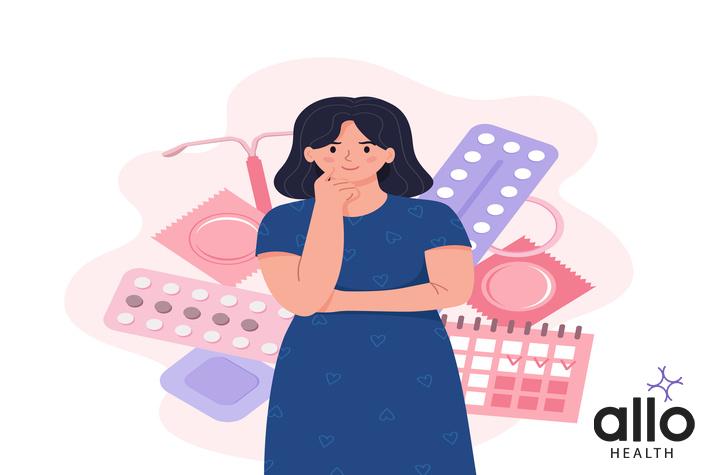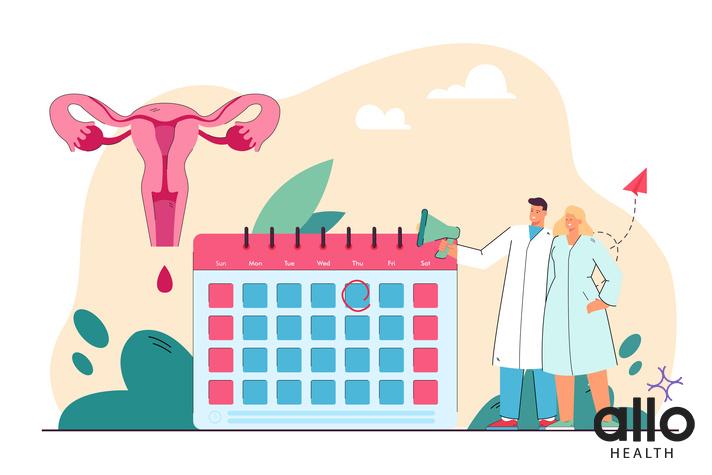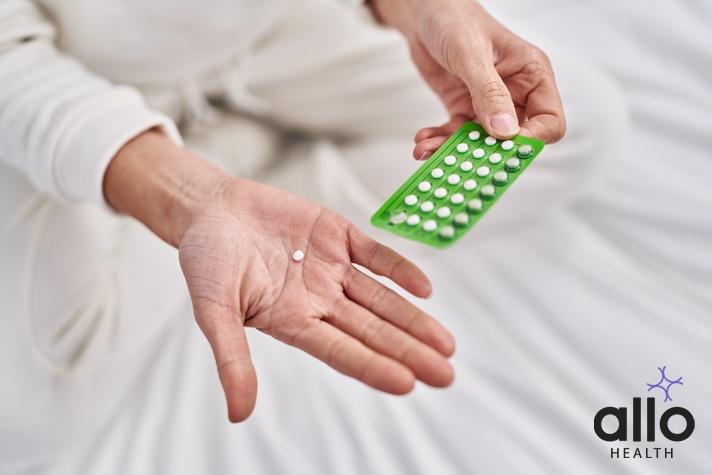The Risks and Consequences of Unprotected Sex During Ovulation

Allo Health is dedicated to personalized well-being, offering support and trusted information tailored to individual health goals. The platform emphasizes human-generated content, led by a distinguished medical team of experts, including physicians and sexual health specialists. Their commitment to credibility involves rigorous fact-checking, authoritative research, and continuous updates to ensure accurate, up-to-date information. Allo Health's unique approach goes beyond conventional platforms, providing expert-led insights and a continuous commitment to excellence, with user feedback playing a crucial role in shaping the platform's authoritative voice.

Dr. Aditi completed her undergraduate medical education at AJIMS, Mangalore, after which she worked in multi-speciality hospitals with COVID patients and in the Pain and Palliative medicine department. Driven by her experiences, she developed a keen interest in psychiatry. Dr. Aditi believes that mental health is just as, if not more important, than physical health.
Why This Was Upated?
Our experts continually monitor the health and wellness space, and we update our articles when new information became available.
Updated on 19 June, 2024
- Article was updated as part of our commitment to diversity, equity, and inclusion.

"The following blog article provides general information and insights on various topics. However, it is important to note that the information presented is not intended as professional advice in any specific field or area. The content of this blog is for general educational and informational purposes only.
Book consultation
The content should not be interpreted as endorsement, recommendation, or guarantee of any product, service, or information mentioned. Readers are solely responsible for the decisions and actions they take based on the information provided in this blog. It is essential to exercise individual judgment, critical thinking, and personal responsibility when applying or implementing any information or suggestions discussed in the blog."
The topic of unprotected sex during ovulation is of paramount importance in the realm of sexual health and reproductive well-being. Understanding the risks and consequences associated with such a practice is essential for individuals seeking to make informed decisions about their sexual activity. This critical discussion delves into the potential ramifications, both immediate and long-term, of engaging in unprotected intercourse during the fertile window of a woman’s menstrual cycle. By shedding light on these issues, we aim to empower individuals with knowledge to make responsible choices regarding their sexual health.
What Is Ovulation and How Does It Work?
Ovulation is a fundamental process in the female reproductive system, crucial for conception and fertility. It is the release of a mature egg from the ovary into the fallopian tube, where it can potentially meet with sperm for fertilization. Ovulation typically occurs in the middle of a woman’s menstrual cycle, triggered by a surge in luteinizing hormone (LH).
This surge is controlled by a complex interplay of hormonal signals involving the hypothalamus, pituitary gland, and ovaries. Ovulation is a tightly regulated event, with various factors influencing its timing, such as stress, nutrition, and health. Understanding when ovulation occurs is vital for those trying to conceive or avoid pregnancy, as it marks the window of fertility.
Monitoring methods, such as tracking basal body temperature, cervical mucus changes, or using ovulation predictor kits, can help women predict their ovulation and optimize their chances of achieving or preventing pregnancy. Overall, understanding ovulation is essential for reproductive health and family planning.
Understanding the Menstrual Cycle

“Understanding the Menstrual Cycle” is a crucial topic for both women and healthcare professionals. The menstrual cycle is a complex, monthly process that involves various hormonal changes and physiological events within a woman’s body. It plays a fundamental role in reproductive health, affecting fertility and overall well-being. Pregnancy can take place within 12-24hrs hours after ovulation.
By comprehending the intricacies of the menstrual cycle, individuals can gain insights into their bodies, detect irregularities, and make informed decisions about contraception, family planning, and managing menstrual-related conditions. This knowledge empowers women to take control of their reproductive health and seek timely medical assistance when necessary, contributing to better overall health and quality of life.
The Importance of Birth Control

- Birth control is essential for family planning, allowing couples to determine the size of their families and the timing of pregnancies.
- It empowers individuals to make informed choices about their reproductive health, leading to better life opportunities and economic stability.
- Access to birth control reduces the number of unintended pregnancies, decreasing the demand for abortion services.
- It can alleviate health conditions such as menstrual disorders, endometriosis, and polycystic ovary syndrome.
- Birth control supports women’s rights by enabling them to participate fully in education, careers, and society.
- Population control helps reduce the strain on limited natural resources and supports environmental sustainability.
Overall, the availability and use of birth control play a crucial role in promoting personal autonomy, women’s sexual health as well as overall health, and global well-being.
Why Unprotected Sex During Ovulation is Risky?

Having unprotected sex during ovulation is risky because it’s the best time for fertilization. Sperm can survive up to five days in the female reproductive system, meaning you can still get pregnant if you have unprotected sex a few days before ovulation. Ovulation is tricky to predict, and the chances of getting pregnant are higher during ovulation.
Additionally, unprotected sex during ovulation can also increase the risk of sexually transmitted infections (STIs). During ovulation, the cervix is more open, making it easier for bacteria and viruses to enter the reproductive system. It’s crucial to use protection, such as condoms, to reduce the risk of contracting STIs during ovulation.
The Chances of Getting Pregnant During Ovulation
The chances of getting pregnant during ovulation are relatively high. If you’re trying to get pregnant, it’s a good idea to track your cycle through an ovulation calculator and have sex during your fertile window.
It’s important to note that while the chances of getting pregnant during ovulation are higher, it’s not a guarantee. Other factors such as sperm count and quality, high sex drive as well as the woman’s overall reproductive health, can also play a role in conception. It’s always a good idea to consult with a healthcare provider if you have concerns about your fertility or are having difficulty getting pregnant.
Symptoms of Ovulation

Ovulation is a crucial phase in a woman’s menstrual cycle when a mature egg is released from the ovary.
- One of the most common symptoms of ovulation is the presence of a noticeable increase in cervical mucus, which becomes clear and slippery, resembling raw egg whites.
- Many women experience mild pelvic or lower abdominal pain, known as mittelschmerz, on one side of the lower abdomen. This discomfort typically lasts a few hours to a couple of days.
- Some may notice a heightened sense of smell, or taste, or even a temporary increase in libido during this time.
- Breast tenderness, changes in basal body temperature, and a positive result on an ovulation predictor kit are other signs that ovulation may be occurring.
- It’s essential to track these symptoms to enhance fertility awareness and family planning.
The Importance of Knowing Your Fertile Window
Understanding the significance of knowing your fertile window is crucial for individuals and couples aspiring to start a family. This vital knowledge empowers women to pinpoint the most fertile days in their menstrual cycle, increasing the chances of successful conception. Timing sexual intercourse during this period enhances the odds of pregnancy, making it a fundamental factor in family planning. Additionally, awareness of the fertile window aids in preventing unintended pregnancies when contraception is desired. Therefore, being well-informed about one’s fertility window is not only beneficial for those trying to conceive but also for those seeking effective contraception.
Common Myths About Conception During Ovulation
Many misconceptions surround the topic of conception during ovulation. One common myth is that pregnancy is only possible on the exact day of ovulation. In reality, the fertile window extends several days before and after ovulation, increasing the chances of conception.
Another myth is that tracking ovulation accurately solely relies on the menstrual cycle’s regularity. However, factors like stress, illness, or lifestyle changes can disrupt the cycle. Debunking these myths is crucial for individuals trying to conceive, as it allows for a more informed and effective approach to family planning and pregnancy.
The Risks of Sexually Transmitted Infections During Ovulation

- Ovulation Vulnerability: Ovulation, a key phase in the menstrual cycle, increases the risk of contracting sexually transmitted infections (STIs) due to hormonal changes.
- Thin Cervical Mucus: During ovulation, cervical mucus becomes thinner and more hospitable to pathogens, making it easier for STIs to penetrate.
- Heightened Immune Suppression: The body’s immune response weakens during ovulation to accommodate potential pregnancy, leaving individuals more susceptible to STIs.
- Increased Sexual Activity: Ovulation often coincides with increased sexual desire and activity, which can lead to higher exposure to potential sources of infection.
- Contraceptive Misuse: Some individuals may reduce or forgo condom use during ovulation, assuming a lower risk of pregnancy, inadvertently increasing their STI risk.
- Importance of Safe Practices: Awareness of these risks highlights the importance of safe sexual practices and regular STI screenings to protect one’s reproductive and overall health.
How to Protect Yourself During Sex to Avoid Pregnancy and STIs?

- Condom Usage: Always use a latex or polyurethane condom to minimize the risk of both pregnancy and STIs.
- Birth Control: Consider using effective birth control methods such as pills, patches, or intrauterine devices (IUDs) in addition to condoms for extra protection against unwanted pregnancies.
- Regular Testing: Get regular STI screenings and encourage your partner to do the same to detect and treat infections early.
- Communication: Open and honest communication with your partner about sexual health is crucial to making informed decisions and ensuring safety.
- Abstaining: Abstaining from sexual activity or limiting partners can also reduce the risk of both pregnancy and Sexually transmitted diseases.
- Stay Informed: Educate yourself about safe sex practices, and ovulation signs and keep up to date with advancements in sexual health.
Fertility Treatments: When You Need Help Conceiving
- Couples’ Struggles: Many couples encounter challenges when trying to conceive naturally, leading to feelings of frustration and despair.
- Medical Evaluation: Seeking help begins with a comprehensive medical evaluation to pinpoint the underlying causes of infertility.
- Available Options: Fertility treatments encompass a range of interventions, such as medication, assisted reproductive technologies (ART), and surgical procedures.
- Personalized Care: Treatments are tailored to individual needs, ensuring a personalized approach to maximize the chances of success.
- Emotional Support: Alongside medical help, emotional support and counseling play a vital role in coping with the emotional toll of infertility.
- Hope and Possibilities: Fertility treatments offer hope and open up possibilities for couples to fulfill their dreams of parenthood.
- Consulting Experts: Consulting with fertility specialists is a proactive step for couples struggling to conceive, helping them navigate this challenging journey with guidance and empathy.
The Emotional Toll of Unprotected Sex and Unplanned Pregnancy
Engaging in unprotected sex and experiencing an unplanned pregnancy can have profound emotional consequences. Individuals involved may grapple with feelings of fear, anxiety, and uncertainty about their future. The emotional toll extends beyond the immediate moment, often causing stress and strain on relationships. Moreover, the prospect of parenthood or difficult decisions related to pregnancy options can evoke a range of emotions, from joy and excitement to sadness and apprehension. Understanding and addressing the emotional challenges associated with these situations is crucial for promoting mental well-being and making informed choices.
What to Do If You Think You Might Be Pregnant After Unprotected Sex During Ovulation?
If you find yourself in the situation of wondering whether you might be pregnant following unprotected intercourse during your ovulation window, it’s crucial to take prompt and responsible action. First and foremost, consider taking a home pregnancy test to determine if you are indeed pregnant. Should the test indicate a positive result, schedule an appointment with a healthcare professional to discuss your options and receive proper guidance on your next steps, whether that be prenatal care, contraception, or any other necessary support. Swift and informed decisions are essential in such situations to ensure your well-being.
Conclusion
In conclusion, the risks and consequences of engaging in unprotected sex during ovulation are a matter of critical concern. This discussion has shed light on the potential implications, including the heightened chances of unintended pregnancies and exposure to sexually transmitted infections. Individuals must prioritize their sexual health and well-being by practicing safe sex, using contraceptives, and maintaining open communication with their partners and healthcare providers. By doing so, individuals can minimize these risks, protect themselves and their partners, and make informed choices about their reproductive health.
Most Asked Questions
-
What are the risks of unprotected sex during ovulation?
Unprotected sex during ovulation can lead to an increased risk of unintended pregnancy. Ovulation is the most fertile time in a woman's menstrual cycle, making it more likely for sperm to fertilize an egg.
-
Can unprotected sex during ovulation lead to sexually transmitted infections (STIs)?
Yes, engaging in unprotected sex during ovulation can also increase the risk of contracting STIs, as the heightened hormonal changes in the body can weaken the immune system's defenses against infections.
-
Are there any health consequences associated with unprotected sex during ovulation?
Apart from the risk of pregnancy and STIs, unprotected sex during ovulation may also cause emotional stress and anxiety for individuals concerned about the potential consequences.
-
How can one reduce the risks of unprotected sex during ovulation?
To reduce risks, individuals can use barrier methods like condoms or opt for hormonal contraception. Communication with a partner and having a backup plan, such as emergency contraception, can also be crucial.
-
Is it possible to accurately predict ovulation to avoid unprotected sex during that time?
Yes, various methods, including tracking menstrual cycles, using ovulation predictor kits, or consulting a healthcare provider, can help individuals pinpoint their fertile window and make informed decisions regarding unprotected sex.






































